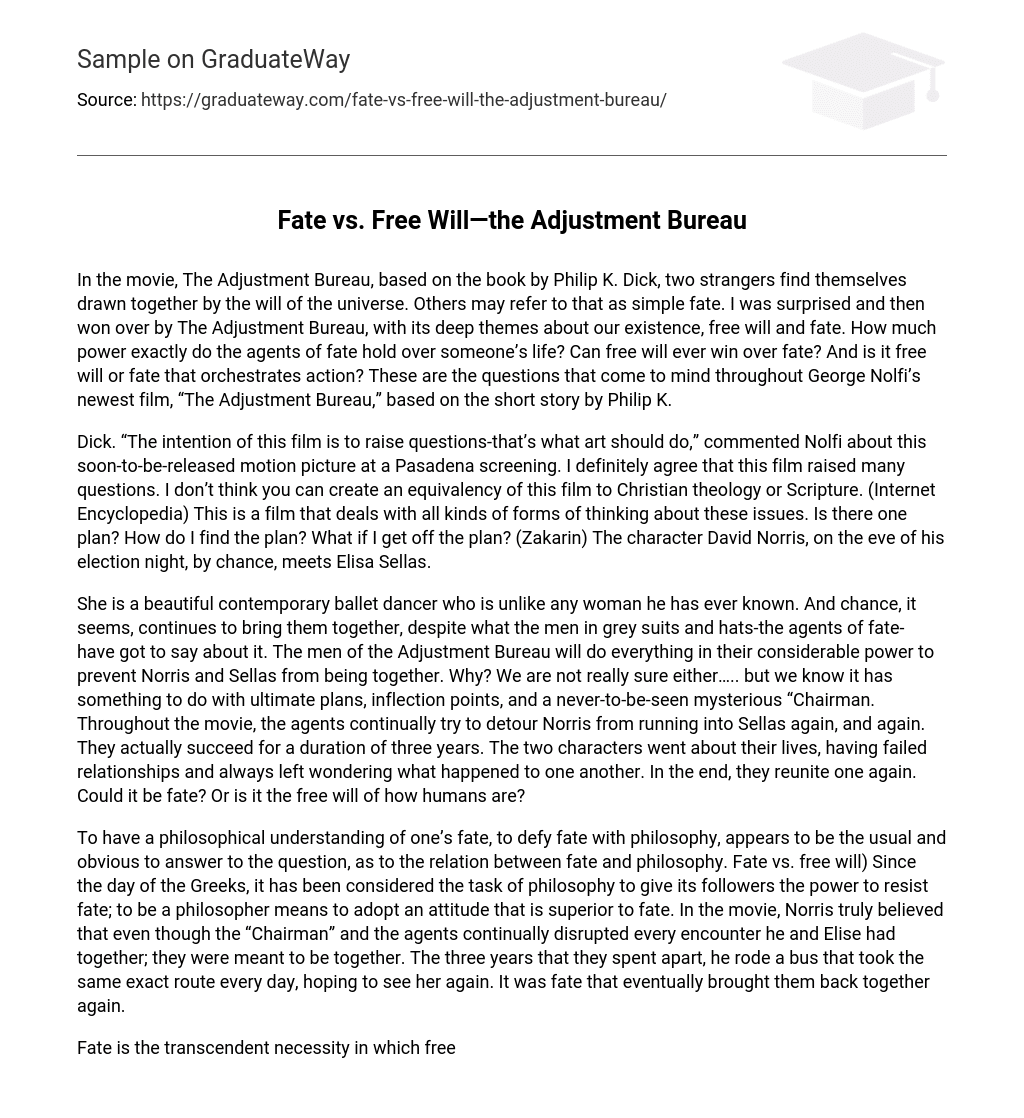In the movie, The Adjustment Bureau, which is based on the book by Philip K. Dick, two strangers are brought together by the universe’s will or what some might call fate. The film surprised me and ultimately won me over with its profound exploration of our existence, the concept of free will, and the influence of fate. The movie delves into the extent of control that agents of fate have over a person’s life. Is it possible for free will to overcome fate? Or does fate ultimately determine our actions? These thought-provoking questions arise throughout George Nolfi’s latest film adaptation of Philip K.’s short story.
Dick. “The intention of this film is to raise questions-that’s what art should do,” stated Nolfi about the upcoming motion picture during a Pasadena screening. I completely agree that this film provoked numerous inquiries. I don’t believe it is possible to equate this film with Christian theology or Scripture. (Internet Encyclopedia) This film explores various perspectives on these matters. Is there a singular plan? How can I uncover the plan? What if I deviate from the plan? (Zakarin) The character David Norris coincidentally encounters Elisa Sellas on the night before his election.
She is an extraordinary contemporary ballet dancer who is unlike any woman he has ever met. By some fortunate coincidence, they continue to cross paths, despite the opposition from the men in grey suits and hats – the agents of fate. The members of the Adjustment Bureau will go to great extents to prevent Norris and Sellas from being together. The exact reasons remain unknown, but it is related to elaborate plans, crucial moments, and a mysterious “Chairman” who remains unseen. Throughout the film, the agents consistently intervene to keep Norris from encountering Sellas once again. They succeed for a duration of three years, during which both individuals experience failed relationships and always wonder about each other’s whereabouts. Ultimately, they are reunited once more. Is it a matter of destiny? Or is it simply the outcome of human free will?
Having a philosophical understanding of one’s fate and defying it with philosophy seems to be the typical response to the question of the relationship between fate and philosophy. Since ancient Greek times, philosophy has been seen as the means to empower individuals to resist their destiny, with being a philosopher indicating a mindset that is above and beyond fate. In the movie, Norris firmly believed that despite constant interference from the “Chairman” and agents, he and Elise were destined to be together. During their three years apart, he commuted on a bus following the exact same route every day in hopes of encountering her again. Eventually, fate brought them back together once more.
Fate and free will are intertwined, with fate being the overarching necessity. This connection can be understood in three ways: first, fate is only applicable when freedom is present. Without freedom, there is only simple necessity. If a higher power attempts to alter or obstruct one’s chosen path, fate can be disrupted. Second, fate implies that freedom is subject to necessity. It places freedom within a broader context. Only someone with absolute freedom would not have any fate. If the characters in a movie were to imprison or erase someone’s memory, their fate would cease to exist.
Their fate remains unknown, a sorrowful circumstance that saddens me. Contemplating this, I realize that if I were meant to meet my ideal partner, I would be relentless in my pursuit until I triumphed! Any obstacles that stood in my way would be fiercely resisted as I remain committed to the path I have chosen. Furthermore, fate suggests that freedom and necessity are interconnected in all fateful events. Are we merely subjects of an unavoidable destiny or do we possess the power to shape our own future?
I believe that the choices we make can completely alter our journey in life. During the Protestant Era, there were numerous possibilities available to us, but we had to choose a single path. How can we determine if this path is the right one for us? In The Adjustment Bureau, Norris believed that he and Elise were destined to be together. However, would he have realized this if the agents hadn’t been caught? There are moments in life when we confront our own free will. During these times, when we feel the weight of destiny, can we truly doubt that we possess the freedom of choice? Perhaps human nature understands this better than science. As students, we were instructed to watch the movie The Adjustment Bureau during one of our scheduled classes. Did we decide to watch it on our own or was there a greater force influencing this decision in order to set off a series of events like the butterfly effect? The debate between free will and fate has puzzled some of the greatest philosophers and may be impossible to answer without having a glimpse behind the curtain or rather, the door.





